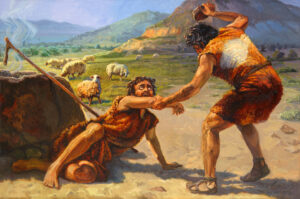The Implosion of Mankind
But You, O Lord, are a God merciful and gracious,Slow to anger
and abundant in lovingkindness and truth.
– Psalm 86:15
![]()
The implosion of a building is always amazing. Carefully placed explosive charges are ignited in a sequence that controls the downfall as much as possible. The actual event is always a spectacle of destructive power. Think of all the hard work that went into producing the edifice and ends up in a pile of rubble and dust.
In the Creation of our world, God was working a plan to crown the creation of His beautiful universe with Earth and mankind. They would come together in a marvelous environment that expressed His glory and functioned in harmony with His holiness and character. Satan however managed to introduce a fatal weakness into creation (sin, beginning with his own rebellion) and proceeded to tempt Adam & Eve to become a part of his conspiracy. Our last study helped us to appreciate how tragic that fall into sin was.
 As we move into the Second and Third generations of Adam’s progeny, we are able to see just how bad the damage is. Signs of sinful humanity collapsing in on itself were showing up everywhere, and the implosion of civilization looks unavoidable. Beginning with Cain’s murder of Abel, Cain’s tribe was driven away from Adam, and the Babel conspiracy proceeded. Already we are seeing the extreme realities of the rebellion Paul describes in Romans 1:18-32. As we move towards God’s decision to judge humanity for its sin by universal flood, we begin to grasp the tragedy that has occurred. If it were not for the longsuffering love of God, all would be lost.
As we move into the Second and Third generations of Adam’s progeny, we are able to see just how bad the damage is. Signs of sinful humanity collapsing in on itself were showing up everywhere, and the implosion of civilization looks unavoidable. Beginning with Cain’s murder of Abel, Cain’s tribe was driven away from Adam, and the Babel conspiracy proceeded. Already we are seeing the extreme realities of the rebellion Paul describes in Romans 1:18-32. As we move towards God’s decision to judge humanity for its sin by universal flood, we begin to grasp the tragedy that has occurred. If it were not for the longsuffering love of God, all would be lost.
Please pause here and open your Bible and read through Genesis 4-5 in one sitting before you continue on through this Bible Study.
 Mankind’s Failure
Mankind’s Failure
 You Shall Surely Die — God’s warning to Adam had been clear (Gen. 2:16-17): you can eat from every tree except the tree of knowledge of good and evil. God always has a plan that gives man purpose but also works to glorify Him. In the Garden, Adam’s purpose was to maintain, manage the Garden (Gen. 2:15). God made sure Adam had all he needed (Gen. 2:16)… but then there was that Tree — it was forbidden, and there was no need to eat from that tree, but Satan created doubt. God made obedience very clear. “You will surely die”(Gen. 2:17) — the grammar in that phrase underscores the seriousness of the result: man would experience spiritual and mortal death. Here is the Essential Moral Code: Obey God and live – it is man’s choice. Sin is rebellion against God and His holiness, no matter what selfishness and lies are in a man’s mind. Rebel against God and die. From Rom. 3:23, we know the result: “all have sinned and fall short of God’s glory.”
You Shall Surely Die — God’s warning to Adam had been clear (Gen. 2:16-17): you can eat from every tree except the tree of knowledge of good and evil. God always has a plan that gives man purpose but also works to glorify Him. In the Garden, Adam’s purpose was to maintain, manage the Garden (Gen. 2:15). God made sure Adam had all he needed (Gen. 2:16)… but then there was that Tree — it was forbidden, and there was no need to eat from that tree, but Satan created doubt. God made obedience very clear. “You will surely die”(Gen. 2:17) — the grammar in that phrase underscores the seriousness of the result: man would experience spiritual and mortal death. Here is the Essential Moral Code: Obey God and live – it is man’s choice. Sin is rebellion against God and His holiness, no matter what selfishness and lies are in a man’s mind. Rebel against God and die. From Rom. 3:23, we know the result: “all have sinned and fall short of God’s glory.”- Choice — God’s nature allows man to have free choice – this started with God’s creation of the angelic hosts from which Satan descended. The choice was: God’s sovereignty and holiness or Satan’s rebellion. Eze. 28:11-19 provides a prophet’s view of the past fall of Satan from heaven, while applying
 his story to the historical king of Tyre. Jesus also quotes Isa. 14:12-15 as describing Satan’s rebellion. Choices are a part of God’s plan, present throughout man’s history, starting before the Fall, then through Adam & Eve to all mankind.
his story to the historical king of Tyre. Jesus also quotes Isa. 14:12-15 as describing Satan’s rebellion. Choices are a part of God’s plan, present throughout man’s history, starting before the Fall, then through Adam & Eve to all mankind. - Without Excuse — Romans 1:18-32 is a thorough summary of the overwhelming evidence of man’s guilt, how man through all his generations has persistently chosen to turn away from God. Man is desperately in need of righteousness which only God can provide – what is interesting is that in much of the false worship man contrives, it seems he has a gnawing awareness of needing to fill a void in his soul for God and His holiness. Romans 1 isn’t an emotional outburst but a carefully planned summary of man’s guilt and obstinate response to a righteous God. Man’s rebellion caused God to give man up (Rom. 1:24, 26, 28) – an ominous summary judgment by the sovereign God of the universe that has impacted every man and woman who has ever lived.
![]() Bible Study Journal
Bible Study Journal
-
-
- Think about the choices involved in the Bible.
- Scan through the book of Job and see the choices he had to make
- Read Matt. 4 and consider the choices He infers His listeners need to make
- Think about the choices believers and unbelievers are shown making in the book or Revelation.
- Think about the choices involved in the Bible.
-
Genesis 4 – Cain’s Sin at the Door
- Worshipping God — God is holiness and the only One Who can teach us about holiness. He is the only subject of true worship, and only He can teach us what true worship looks like. He is holy and He is Spirit (Jn. 4:24), He is the domain for true worship, and He determines how it is accomplished. By revelation given from God to Adam and Eve, and probably through them to Cain & Abel, they were made aware of how to worship God. This revelation must have included that it was God’s guidance that blood sacrifice is the right path, a truth that had already been indicated when God provided clothing made of animal skin to Adam & Eve. According to Gen. 4, God only accepted Abel’s offering. Cain and Abel both had respectable occupations, but God only accepted one offering. Abel got it right and Cain didn’t. Cain’s worship fell short, and it descended into sinful rebellion.
- Cain’s heart was bad. Jude 11 tells us Cain had no faith, the “way of Cain” brought about failed/misguided worship. God told Cain that sin was crouching at his door (Gen. 4:7) and anger burst from his heart. Cain chose to reject God’s pattern for worship – he
 sinned. This picture of sin is serious – it desires to devour us and we must be on guard, empowered by God’s Holy Spirit to conquer it. Satan prowls around seeking to devour us as his prey – we must be vigilant, ready to resist and stand firm (1 Pet. 5:8). James 1:14-15 warns us that when we allow sin into our lives, it will seek to flourish in our heart and when full-grown will bring about spiritual death. Sin is serious!
sinned. This picture of sin is serious – it desires to devour us and we must be on guard, empowered by God’s Holy Spirit to conquer it. Satan prowls around seeking to devour us as his prey – we must be vigilant, ready to resist and stand firm (1 Pet. 5:8). James 1:14-15 warns us that when we allow sin into our lives, it will seek to flourish in our heart and when full-grown will bring about spiritual death. Sin is serious! - Cain’s descendants — Cain was Adam’s firstborn, but sin destroyed him, he was apparently cast out from his family and ended up taking his descendants east resulting in a legacy that still haunts mankind today. His progeny are identified as manifesting the downward spiritual and moral trajectory of mankind, bent on lawlessness, turning away from God and His blessing. His response is self-pity, not repentance. Gen. 4:11-14, Cain was banished, just like Adam & Eve had been, driven away from God and His blessing. His response is self-pity, not repentance. God cursed Satan for his sin, but not Adam. But now He curses Cain, his lineage was bent on lawlessness. God had promised Adam that He would bless his descendants through Seth, but Cain abandoned that blessing.
- The Line of Promise Continues — Seth replaced Cain (Gen. 4:25-26) in the “seed line” that bring us the Messiah – his line sought after God, men began to call on the name of the Lord. Regrettably, the sad story of sibling rivalry, dysfunction, fractured families continues to be repeated: Ishmael replaced by Isaac, Esau replaced by Jacob, Reuben replaced by Joseph’s sons. The Messianic line can be followed through the Bible, helped along by the genealogies in Matt. 1:2-16 and Lu. 3:23-38. The evidence demonstrates that God has been administering His plan of Redemption through the ages, from the first promise of a Redeemer in Gen. 3:15, to the promise of the coming of the Messiah, Who came the first time as the Suffering Servant, and will come a second time as our Conquering Savior and Lord.
Bible Study Journal
Sin is serious! Turning away, against God’s holiness has negative results. Open your Study Journal and note those verses about sin mentioned above. Write down a few of the key words or phrases from each text.
-
-
- Gen. 4:7
- Jude 11
- 1 Pet. 5:8
- James 1:14-18
-
Genesis 5, Generations of Hope and Collapse

In Gen. 4:26, God breaks through the clouds of rebellion with the family and descendants of Seth and his son Enosh. One sentence expresses the hope of God – “Men began to call upon the name of the Lord.” The name “Enosh” means “granted” or “to set in place”. This reminds us of God’s promise to Eve to provide a Redeemer (Gen. 3:15) and her resulting faith that God would provide that blessed Seed in spite of the death that came upon man. With this turn away from Cain, God gives to the human race a faith-based hope which is fulfilled when God’s Son, the Messiah, became a man and took on the form of a servant in order to go to the Cross (Phil. 2:5-8). In Gen. 5:1, with the Hebrew “toledoth” (translated “generations”, see Gen. 2:4; 6:8), the writer Moses chooses to mark another transition in his account of man’s history which falls into destructive sin and implosion. About 1500 years pass from Enoch to Noah, approximately 20% of all human history. In Gen. 5-6, two generations of mankind come and go as God prepares to bring unimaginable judgment on the human race. From Gen. 4:26, where people are calling on the Lord, even telling of Enoch (Gen. 5:22-24) walking with God, Methuselah living to 969 years (he actually died the year the Flood began), and finally Noah was born to Lamech.
Sadly, surrounding that special work of God with Enosh and Noah, the people of the world were plunging into wickedness (Gen. 6:5-6), so badly that God regretted His creation of man — an unimaginable expression of grief considering the great delight the Creator God had in His beautiful creation. Wickedness was great on the earth, demonic powers freely preying on civilization — compare Paul’s description of sin’s ugliness in angry, fallen, selfish people (Gal. 5:17-21). Note that in Gen. 6:9, there is another mention of “toledoth” as Moses indicates a third major transition in Man’s generations. It’s important to remember that in God’s Story, hope is not lost, as bad as it seemed to be in Gen. 6:5, because in the face of Judgment, Noah found God’s grace.
-
-
- As we move next to think about the Flood, stop first and review Gen. 5-6 and note the character of God — what He says and does. He judges sin, but He extends grace to the faithful.
- Look up these three signs of collapse in the years leading up to the Flood:
- Demonic invasion, 6:1-4
- Sexual wickedness, 6:5
- Corruption & violence, 6:11
-
 Study Questions
Study Questions
-
- What does Heb. 11:4 tell us about Cain & Abel?
- Did either Cain or Abel understand why they were offering a sacrifice?
- What does Gen. 4:16 tell you about Cain?
- What was the good news about Eve’s third child (4:25)?
- From 5:22, why do you think God took Enoch early in life?
- In addition to Enoch, what other person did God take to heaven alive?
- What is the name of Noah’s sons, in birth order?
- From Gen. 6:1-7, what are some of the characteristics of the people living in Noah’s time before the flood?
- God is loving and kind. So why does He also allow people to die in judgment?
- From Gen. 6:9ff, what characteristics of Noah led God to choose him?




